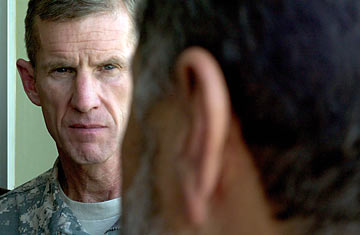
Following the murder of the chief of police and an outbreak of fighting by insurgents in the city's streets, General Stanley McChrystal, newly appointed head of forces in Afghanistan, is briefed by an Afghan National Army commander at a base in Kandahar
(5 of 7)
Any anecdotes to share?
There have been an awful lot. Let me think ... There are a lot of them, and all teach me something different. Spring 2008, went to a FOB [forward-operating base], we had launched a raid, and our guys had been in combat at 5-m distance, so much so that one of the young sergeants had to pick up an enemy machine gun and keep fighting. Another had, although wounded, already picked up a hand grenade that came on his position and attempted to throw it back and lost half of his arm in the process. I saw him later with a prosthetic arm, and he was upbeat and focused, and as I sat with those guys that night, it was the focused professionalism of those guys. It was amazing — they were not shook. And [I said], "O.K., where were you on 9/11?" And I was a general officer, and he looked at me and said, "Sir, I was in sixth grade." And that reminded me of something. It reminded me of what kind of force we had. I'll think of others.
More in general, what did your previous time in the country teach you?
Because I got to see a fair amount of the country and the focus on the gathering of the operations enabled by intelligence, it was the need to understand what was happening. The focus on not looking at the superficial or most obvious. It's the trying to get several layers down into what happened. Because as we would try to conduct operations in an area, the most obvious was usually the most incorrect. So you had to get down to what the motivation of somebody we had identified as an insurgent really is. Who is he connected to? It is not a monolithic enemy here. And they have been fighting for 30 years, and they have got lots of different reasons for fighting, and I am not sure there are two different people out there with the same reason for the fight. And so you have to be careful not to think you are going against a foe with a single doctrine or single motivation.
What benchmarks will be most important to track your progress?
I think it will be governance. We are going to do security. But that is to enable governance. At the end of the day, the amount of the population, the percentage of the population in the areas we serve, that we can provide enough legitimate governance in the eyes of the individuals, will determine our effectiveness. Because we are competing with the Taliban for influence and control of the population. The analogy that a smart young guy I work with is that it is an argument. In conventional war, what you do is, you have an argument, and when the argument is over, you start fighting. And no one thinks during the fight, afterwards you will end up going to the peace table. And you end up with a completely different outcome than you wanted. Counterinsurgency is an ongoing argument. Everything you do in an operation or influence is trying to convince the population in one way or the other. So my metric is our success in the argument. It's not the enemy killed, it's not ground taken. It's how much governance we've got and where governance goes. It's people's willingness to conduct normal lives. But here you have to know what normal is. It's not the same in Kabul as Barakat.
There are all kinds of metrics. From freedom of movement to polling data to assessments from different parts — economic activity. But you have to do a very detailed analysis, because if your metric isn't right, in terms of how you measure — so you have to take all the metrics together.
Will you be setting benchmarks?
There are a lot of efforts to set benchmarks. I think we have to be careful in that, because if they are too brittle — if you say 60% of people must have running water or whatever — you run the risk of that not being a really accurate assessment of the situation. So it has to be a lot more subtle. But you do have to have a way of pulling these together and knowing when you are making progress.
Any public benchmarks?
They are fairly broad. The progress in governance, reduction in corruption.
I think our job and my job is to have the best outcome I can for Afghanistan. So I think I am partnered with a lot of people — Karl Eikenberry, the ambassador — and you can't say, O.K., you are security, you are governance — that won't work. They overlap so much that you have got to be partnered. And down at the lowest levels where the captains and sergeants are operating, it's absolutely overlapped.
